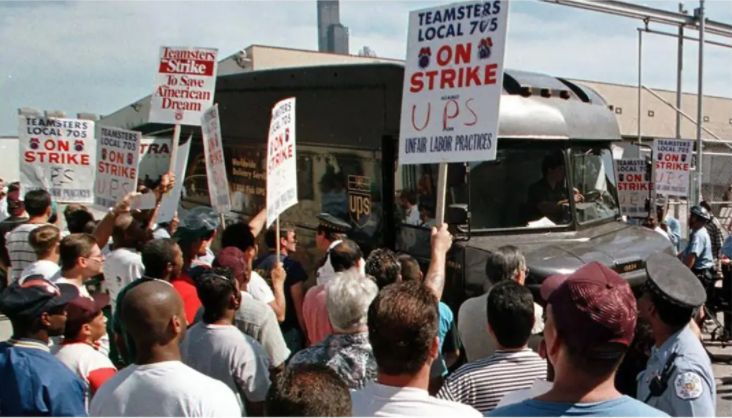This year’s cross-border freight forwarding circle can be described as “dire water”,and many leading freight forwarding companies have been hit by thunder one after another.
Some time ago, a certain freight forwarder was dragged by a customer to the company to defend its rights,and then another freight forwarder directly left the shipment at the port and ran away, leaving a bunch of customers waiting to be put on the shelves in a mess in the wind…..
Thunderstorms occur frequently in the cross-border freight forwarding circle, and sellers suffer heavy losses
At the beginning of June,it was revealed that the capital chain of a freight forwarding company in Shenzhen was broken.It is said that the freight forwarder was established in 2017 and has been operating smoothly for 6 years.There have been basically no problems before,and the reputation of customers is also good.
When it comes to this freight forwarder in the cross-border circle, most people think that it is a bit famous,the channel is not bad, and the timeliness is okay. After many sellers heard that this freight forwarder had exploded, they felt very incredible.The volume of this freight forwarder has always been good, which means that the number of shipments that many customers have been pressed may be relatively large, so that it has reached the level of “going to the roof”.
To this day,the logistics company involved has not yet responded to the news,and another chat screenshot about “thunderstorms by multiple freight forwarders” has been circulated in the cross-border industry.The whistleblower in the screenshot claimed that the four freight forwarders Kai*,Niu*, Lian*,and Da* have been detained by the United States for a lot of goods, and the sellers who cooperate with them should stop losses in time.
These four are large-scale and well-known freight forwarding companies in the industry. It would be a bit unreliable to say that they all had a thunderstorm together. Due to the wide spread of the news, this revelation also attracted the attention of the companies involved. The three freight forwarders Kai*, New York*, and Lian* quickly issued a solemn statement: the news of the company’s thunderstorm on the Internet is all rumors.
Judging from the circulating news, the revelation has no other content except a screenshot of the chat.,At present, cross-border sellers are in a state of “all grass and trees” about the news of freight forwarding companies.
Freight forwarding thunderstorms often hurt the most are the cargo owners and sellers. A cross-border seller said that all the freight forwarders, overseas warehouses and car dealers that cooperated with the freight forwarding company involved have detained the goods of the owner and asked the owner to pay a high redemption fee.This situation makes him think deeply:no matter what the solution is, as a seller, he bears the entire risk chain. This incident is not just an individual case, but a common problem in the logistics industry.
UPS may face largest strike
According to foreign media reports, on June 16, the largest union of international truck drivers (Teamsters) in the United States voted on the question of whether UPS employees “agree to launch strike action”.
The voting results showed that among more than 340,000 UPS employees represented by the Teamsters union, 97% of the employees agreed to the strike action, that is, if Teamsters and UPS cannot reach a new agreement before the contract expires (July 31). Agreement,Teamsters is likely to organize employees to hold the largest UPS strike since 1997.
The previous contract between Teamsters and UPS expires on July 31, 2023. As a result, since early May of this year, UPS and Teamsters have been negotiating contracts for UPS workers.The main negotiation issues have focused on higher wages, creating more full-time jobs and eliminating UPS’s dependence on low-paid delivery drivers.
At present, the Teamsters union and UPS have reached more than two preliminary agreements on their contracts,but for more UPS employees, the most important compensation issue remains unresolved. Therefore, Teamsters recently held the strike vote mentioned above.
According to Pitney Bowes,a global shipping and logistics company,UPS delivers about 25 million packages every day,accounting for about a quarter of the total number of packages in the United States, and there is no express company that can replace UPS in the market.
Once the above-mentioned strikes are launched, the supply chain during the peak season in the United States will undoubtedly be seriously disrupted, and even have a devastating impact on the economy that relies on its distribution infrastructure.Cross-border e-commerce is one of the industries that bear the brunt. For cross-border sellers, this is simply adding to the already severely delayed logistics and transportation.
At present, for all cross-border sellers, the most important thing is to successfully store the goods before the membership day cut-off date, always pay attention to the transportation track of the goods, and take risk assessment and preventive measures.
How do sellers deal with the troubled times of cross-border logistics?
Customs statistics show that in 2022, my country’s cross-border e-commerce import and export scale exceeded 2 trillion yuan for the first time, reaching 2.1 trillion yuan, a year-on-year increase of 7.1%, of which exports were 1.53 trillion yuan, a year-on-year increase of 10.1%.
Cross-border e-commerce still maintains a rapid growth momentum and is injecting new momentum into the development of foreign trade. But opportunities always coexist with risks.In the cross-border e-commerce industry with huge development opportunities,cross-border sellers often need to face the accompanying risks.The following are some countermeasures for sellers to avoid stepping on mines:
1. Understand and review the qualification and strength of the freight forwarder in advance
Before cooperating with a freight forwarder, sellers should understand the qualification, strength and reputation of the freight forwarder in advance. Especially for some small freight forwarding companies, sellers should carefully consider whether to cooperate with them.
After learning about it, sellers should also continue to pay attention to the business development and operation of the freight forwarder, so as to adjust the cooperation strategy at any time.
2. Reduce dependence on a single freight forwarder
When dealing with the risk of freight forwarding thunderstorms, sellers should adopt diversified coping strategies to avoid over-reliance on a single freight forwarder.
Adopting a diversified forwarding agent strategy plays an important role in the risk control of the seller.
3. Actively communicate and negotiate solutions with freight forwarders
When the freight forwarding company encounters accidents or economic difficulties, the seller should actively communicate and coordinate with the freight forwarding party to reach a reasonable solution as much as possible.
At the same time, the seller can also seek the assistance of a third-party organization to speed up the resolution of the problem.
4. Establish a risk warning mechanism
Establish a risk warning mechanism and make emergency preparations Facing the risk of freight forwarding thunderstorms, sellers should eventually establish their own risk warning mechanism to detect risks in a timely manner and take countermeasures to effectively avoid blockage of supply and protect their own interests.
At the same time, sellers should also establish an emergency preparedness plan to comprehensively predict and record possible problems, so as to provide powerful help in dealing with emergencies.
In short, sellers should respond wisely to the risk of freight forwarding thunderstorms, improve their own risk control capabilities, keep abreast of the qualifications and strengths of freight forwarders, reduce their dependence on single freight forwarders, actively communicate with freight forwarders, and establish risk warning mechanisms and emergency preparedness plans. Only in this way can we take the initiative in the increasingly fierce market competition and ensure our own safety and development.
Only when the tide goes out do you know who is swimming naked. In the post-epidemic era, cross-border logistics is not a profitable industry. It needs to form its own advantages through long-term accumulation, and finally reach a win-win situation with sellers. At present, the survival of the fittest in the cross-border circle is obvious, and only strong and responsible logistics companies can run a real service brand on the cross-border track.
Post time: Jun-25-2023






